The Taiwan Railways Administration (TRA) would be allowed to raise ticket prices in 2024 if its safety and punctuality record improves, Minister of Transportation and Communications Wang Kwo-tsai (王國材) told an online talk show yesterday.
Wang was invited by Yahoo TV host and political commentator Wang Shi-chi (王時齊) to talk abut the Statutes Governing the Establishment of the State-Run Taiwan Railway Co (國營台灣鐵路股份有限公司設置條例), which the legislature passed on May 27.
Wang Shi-chi asked if the ministry plans to adjust TRA fares, which have not changed for 26 years, despite its annual personnel expenditure exceeding NT$10 billion (US$338.75 million).
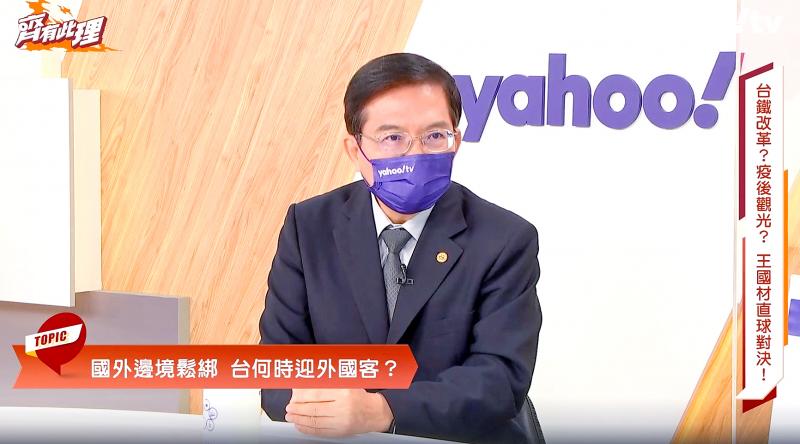
Photo: Screengrab from the Yahoo TV Web site
“It is not that we should not talk about raising ticket prices. It is a topic that we can talk about when the TRA delivers safe and punctual railway services,” the minister said. “If the railway agency shows significant improvements in safety and punctuality, I see no problem with adjusting ticket prices when the railway company is officially established in 2024.”
The TRA sustained an average loss of NT$5 billion per year over the past five years, he said.
“After the [past] two fatal train derailments, a structural change was considered to be key to comprehensive reform at the TRA,” Wang Kwo-tsai said. “Many people would find it difficult to accept if the agency were allowed to raise ticket prices at this time.”
TRA services are less punctual than those of the high-speed rail and MRT systems because it has 23 different types of trains in its fleet, he said.
“We have begun to streamline train types by replacing some of the old trains with newly purchased EMU900 commuter trains and EMU3000 intercity trains,” he said, adding that the measure is crucial in enhancing the TRA’s service quality.
The bill sailed through the Legislative Yuan last month as the public has reached a consensus on the issue, and it was supported by the Presidential Office, the Executive Yuan and lawmakers across party lines, he said.
He was also asked when borders would be reopened to international travelers, as several Asian countries, including Singapore, Thailand, Japan and South Korea, have lifted or relaxed quarantine and testing requirements for travelers regardless of whether they have been vaccinated against COVID-19.
The Tourism Bureau has stipulated disease prevention guidelines for inbound and outbound tourists, which must be submitted to the Central Epidemic Command Center (CECC) for final approval, he said.
Based on the proposed guidelines, all foreign arrivals would be required to have received three doses of a COVID-19 vaccine and to present a negative polymerase chain reaction test result, he said.
Package tour groups must come and leave the country as a group, he added.
“The CECC and the Ministry of Foreign Affairs are still discussing if the country should open borders to tour groups first, or if it should simultaneously open to group and independent travelers,” he said.
The CECC’s main concern is whether Taiwan has adequate healthcare capacity to cope with a potential surge in COVID-19 cases, as the local outbreak has plateaued, but remains high, and subvariants of the Omicron variant of SARS-CoV-2 are emerging in other countries, Wang Kwo-tsai said.
The Executive Yuan has agreed to the ministry’s plan to provide a NT$6 billion stimulus fund program to shore up the domestic travel industry from July 15 to Dec. 15, which is expected to benefit travel agencies, hotels and amusement park operators, he said.
“Tour operators can use the time before borders reopen as a warmup period for hosting international travelers,” he said. “We are also encouraging people to travel domestically while the borders are still closed. With the subsidy, they can visit scenic spots in Taiwan that are just as beautiful as those in other countries.”
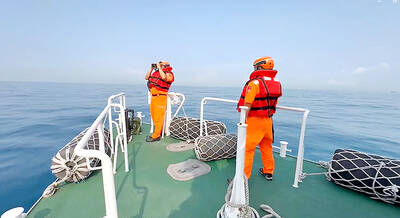
An increase in Taiwanese boats using China-made automatic identification systems (AIS) could confuse coast guards patrolling waters off Taiwan’s southwest coast and become a loophole in the national security system, sources familiar with the matter said yesterday. Taiwan ADIZ, a Facebook page created by enthusiasts who monitor Chinese military activities in airspace and waters off Taiwan’s southwest coast, on Saturday identified what seemed to be a Chinese cargo container ship near Penghu County. The Coast Guard Administration went to the location after receiving the tip and found that it was a Taiwanese yacht, which had a Chinese AIS installed. Similar instances had also
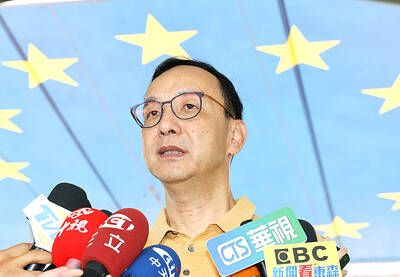
GOOD DIPLOMACY: The KMT has maintained close contact with representative offices in Taiwan and had extended an invitation to Russia as well, the KMT said The Chinese Nationalist Party (KMT) would “appropriately handle” the fallout from an invitation it had extended to Russia’s representative to Taipei to attend its international banquet last month, KMT Chairman Eric Chu (朱立倫) said yesterday. US and EU representatives in Taiwan boycotted the event, and only later agreed to attend after the KMT rescinded its invitation to the Russian representative. The KMT has maintained long-term close contact with all representative offices and embassies in Taiwan, and had extended the invitation as a practice of good diplomacy, Chu said. “Some EU countries have expressed their opinions of Russia, and the KMT respects that,” he
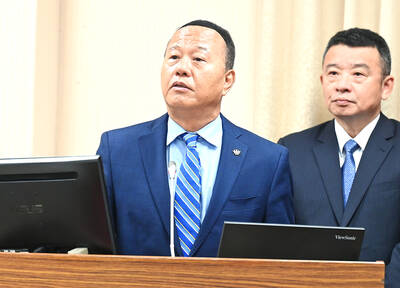
VIGILANCE: The military is paying close attention to actions that might damage peace and stability in the region, the deputy minister of national defense said The People’s Republic of China (PRC) might consider initiating a hack on Taiwanese networks on May 20, the day of the inauguration ceremony of president-elect William Lai (賴清德), sources familiar with cross-strait issues said. While US Secretary of State Anthony Blinken’s statement of the US expectation “that all sides will conduct themselves with restraint and prudence in the period ahead” would prevent military actions by China, Beijing could still try to sabotage Taiwan’s inauguration ceremony, the source said. China might gain access to the video screens outside of the Presidential Office Building and display embarrassing messages from Beijing, such as congratulating Lai
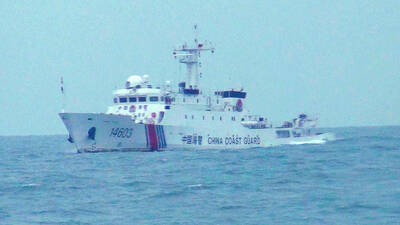
Four China Coast Guard ships briefly sailed through prohibited waters near Kinmen County, Taipei said, urging Beijing to stop actions that endanger navigation safety. The Chinese ships entered waters south of Kinmen, 5km from the Chinese city of Xiamen, at about 3:30pm on Monday, the Coast Guard Administration said in a statement later the same day. The ships “sailed out of our prohibited and restricted waters” about an hour later, the agency said, urging Beijing to immediately stop “behavior that endangers navigation safety.” Ministry of National Defense spokesman Sun Li-fang (孫立方) yesterday told reporters that Taiwan would boost support to the Coast Guard